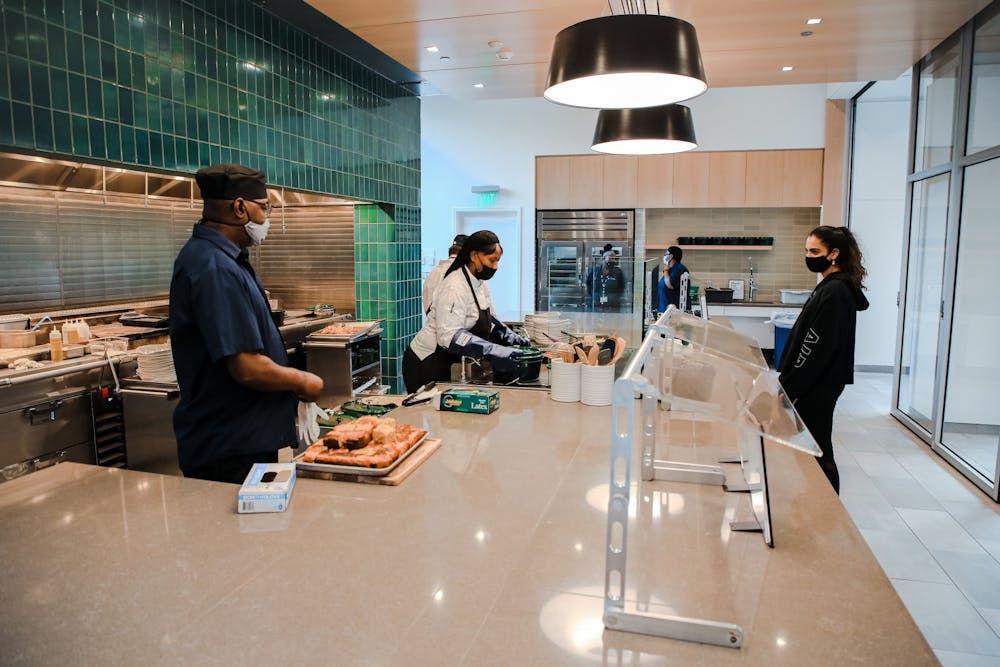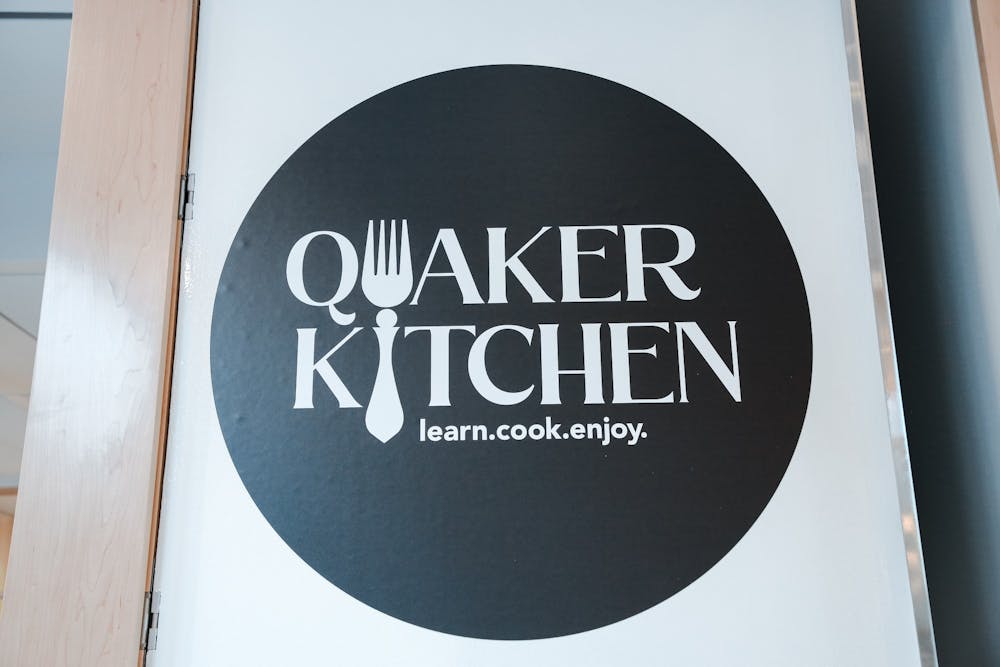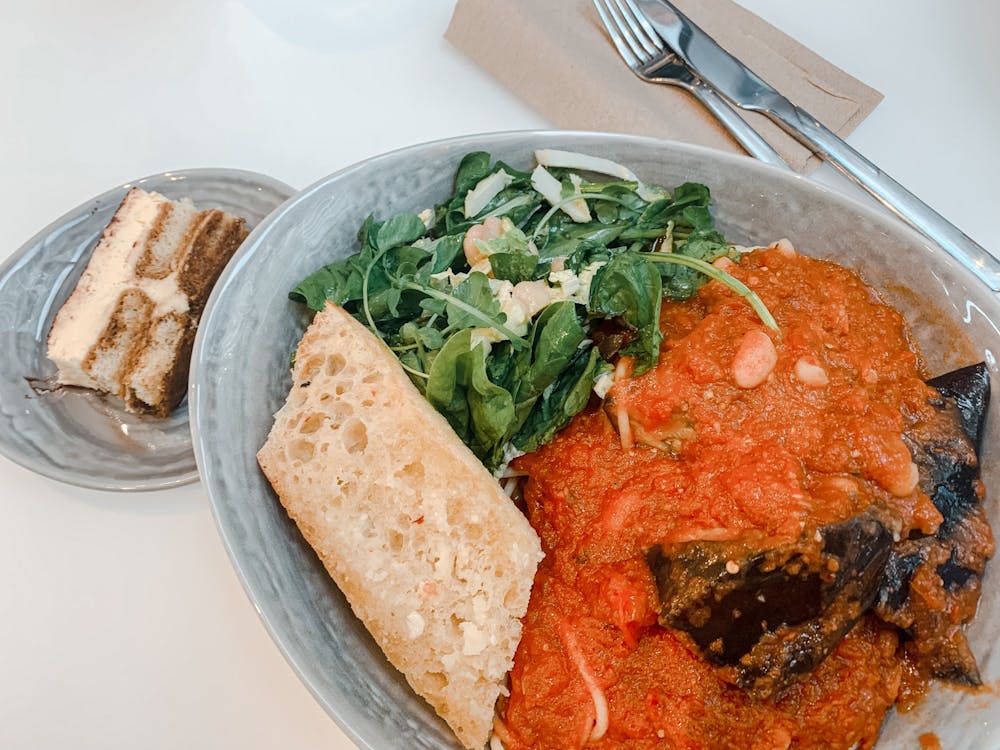When I enter the kitchen, I’m greeted by a chef tossing salad. Behind him, a huge pot of water bubbles, and sauce is stirred over a stovetop. I’m hit with the smell of spices, sweet tomatoes, and garlicky bread baking in the oven. I immediately feel immersed in the kitchen, a sense of excitement washing over me as another chef asks me how I’d like my food prepared and carefully plates my meal. For a moment, I forget I’m in a dining hall.
Born out of a Penn Dining program that provided cooking expositions to students with Bon Appétit chefs, Quaker Kitchen is the newest addition to Penn’s suite of dining halls. Quaker Kitchen uniquely runs on a reservation system, with a capacity of 75 people at any given time and an absolute threshold of 150 dishes served per night. With no lines or crowds and no fights for a good table, Quaker Kitchen is a welcome respite from the overwhelming nature of crowded weeknight dining halls. But if you want to eat there, you have to plan ahead—reservations are limited and often fill up early in the day. The intentionality of making a reservation and sitting down for a meal after a long day of classes is, in and of itself, part of Quaker Kitchen’s intrigue.
While cooking demonstrations—a coming attraction of the dining experiment outlined by New College House West Director Trina Sokoloski—have yet to be fully integrated at Quaker Kitchen or New College House West at large, the promise of a homey dining experience is already budding at Penn’s newest campus eatery.

The path to Quaker Kitchen is admittedly disorienting. You have to walk past the dining area positioned at the front of the building, around the courtyard, past the elevators, and through the lounges to reach the kitchen—effectively circling half of the first floor just to scan in and get your food.
Tiny electric candles sit on each of the tables. I can imagine a pair of first–years settling in here for a low–pressure is–this–or–isn’t–this–a–date meal spot. The small capacity gives the space a sense of privacy, but the kitchen's public enough to residents of the building and people walking past that it doesn't feel uncomfortably intimate. There are a handful of people who, like me, sit alone—taking in the food or checking their emails while they eat.
The menu shifts weekly. On this particular night, the kitchen is serving up classic Italian American fare: spaghetti and tomato sauce, salad, bread, and for dessert, tiramisu. Unlike the typical dining hall, which features a few different food stations, Quaker Kitchen serves a single meal (with different options for the central meat or a vegan alternative).
Though the smell of the meatballs and Italian sausage make me question my efforts to cut down on animal product consumption for a moment, I go for the vegan option: huge medallions of herb–roasted eggplant served with white beans and marinara sauce.
I don’t usually love eggplant, but this is delicious—it's gently roasted, mild, and slightly sweet, highlighting the vegetable's natural flavors rather than bathing it in unnecessary spice. The sauce is acidic and a bit under–seasoned for my taste, but I register a hint of red pepper flake that adds some dimension and makes it a good complement for the otherwise bland bed of spaghetti underneath.
An unexpected but welcome addition are the white beans, whose grainy quality provide a level of textural balance to the soft pasta that's been drowned a little too heavily in the hearty sauce. On the side is a roasted mushroom salad with a citrus dressing and sweet artichoke wedges, which serves as a much–needed bright and fresh counterpart to the heavy entrée.

The highlight of the meal is dessert: The slice of tiramisu has layers of mascarpone, pastry, and delicate espresso to perfectly cap a surprisingly satisfying meal.
Overall, the portion is generous enough that I have no desire for seconds, but not so large that I feel like I've overeaten—a challenging line to walk when it comes to dining hall noshing. The food's high quality is realistically inaccessible to the average college student, unless they’re willing to shell out $20+ per person at a mid–priced sit–down place in Center City. It's the sort of comprehensive, well–thought–out meal I’d like to pretend I have the capacity to cook for myself in my dorm room kitchen.
As much I enjoy the food, the most special part of eating at Quaker Kitchen is certainly the ambiance of New College House West. Not unlike Hill House Dining Hall, you can’t help but be aware that you're eating in the middle of a dorm, as you're fully in sight of people returning to their rooms after class or rushing off to the library under the weight of their backpacks. But with the outdoor spaces visible through the huge glass windows, the towering ceilings, and the overall modern design of the building, Quaker Kitchen creates a sense of openness that provides a certain reprieve compared to the enclosures at Hill House or Commons.
As I eat alone and take in the culinary experience, some students sit and chatter in small groups. One group heads outside with their food, settling at a picnic–style table in New College House West’s central courtyard. It’s quiet compared to the typical dining hall—there's no clatter of flatware, but rather a low hum and the distant sound of the chefs in the kitchen on the other side of the wall. It’s the perfect place for quiet conversation among friends, but it's equally friendly to solo diners who want a peaceful meal to themselves.

When I’m finished, I take my plate back to the kitchen, where I’m introduced to another quirk of Quaker Kitchen: You do your own dishes. No conveyor belts here—instead, I place my plate and cutlery in the large dishwasher adjacent to the kitchen. The gesture adds to the sense of having just eaten a home–cooked meal.
Quaker Kitchen is far from a replacement for Philly’s outstanding restaurant scene, and it's also not a consolation for the rigidity of life on a dining plan. But for those who live a meal–plan–based lifestyle, it’s a welcome alternative to the fast pace and crudity of a typical dining hall dinner.
TL;DR: So good it almost makes you forget you're in a dining hall. Almost.
Hours: 5 p.m.–8 p.m. Monday through Friday; reservation required

